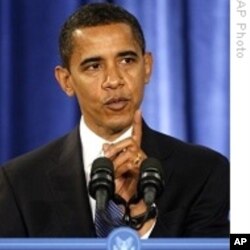President Obama and Secretary of State Clinton used Thursday’s National Prayer Breakfast in part to address anti-homosexual legislation in Uganda.
The legislation before parliament would impose strict penalties against gays, lesbians and bisexuals, including life imprisonment and in some cases the death penalty.
President Obama described it as “odious,” while Mrs. Clinton said she had called Ugandan President Museveni recently “and expressed the strongest concerns about a law being considered in the parliament of Uganda.”
Many in the United States, including members of Congress and others around the world, have criticized the bill. U.N. High Commissioner for Human Rights Navi Pillay says it violates international human rights standards and “threatens to seriously damage” Uganda’s reputation.
President Obama also used the occasion to call for dialogue and civility in settling differences, rather than having opposing sides of an issue demonize each other.
Among those monitoring Mr. Obama’s remarks was Penn State University’s Jenny Trinitapoli, assistant professor of sociology, demography and religious studies.
“President Obama, like other presidents, has prioritized dialogue with religious groups in the United States. And in that sense he attempted to be very pluralistic, welcoming all members of all religions, even though it is a predominantly protestant group. But that’s very typical of American politics,’ she says.
Rejected calls to boycott
Before the prayer breakfast, some had called on President Obama to boycott it because of its ties with some fundamentalist evangelicals.
“The controversy has something to do with Uganda and the proposed legislation there. But it also has to do with questions about who the president should be conversing with and under what conditions. American ‘progressives’ are unhappy to see him meeting with what they consider to be a dangerous fringe group and who have been critical of him,” says Trinitapoli.
But Mr. Obama has a history of meeting with those who disagree with him, she says, and “evangelicals have been at the table from the very beginning. There was controversy about (Reverend) Rick Warren being selected to pray at his inauguration. And this is a pretty similar step.”
The president used the event to put forth his vision of moral leadership, human dignity and equality, says the Penn State professor.
“Challenging each other’s ideas can renew our democracy,” says Mr. Obama, “but when we challenge each other’s motives it becomes harder to see what we have in common.”
On gay rights, he says, "Surely we can agree that it is unconscionable to target gays and lesbians for who they are, whether it’s here in the United States or…more extremely in odious laws that are being proposed, most recently in Uganda.”
Mr. Obama spoke both as the president and a person of faith, says Trinitapoli.
“The borders of religion transcend national borders. And given the close connections between Christians in the United States and all over the world, not only in Africa, it seems like a very appropriate strategy to address, in particular, this very controversial issue,” she says. “To not have said anything about it would have been a missed opportunity to each of them to demonstrate their moral leadership.”
Odious
The professor says she thinks “odious” is a strong work to describe the Ugandan legislation. But she adds, “I think some people will be disappointed and say he didn’t go far enough. That he didn’t talk in more detail about gays and lesbians, whereas Hillary Clinton talked about persecution and discrimination against gays and lesbians.”
While Mr. Obama and Mrs. Clinton took different strategies overall, says Trinitapoli, “they sent a very strong message that the idea of imprisoning people for life or killing them can’t be reconciled with any working notion of justice or human rights.”




